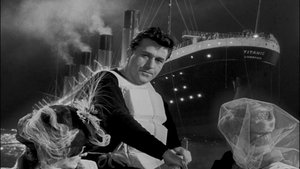Contact: info@alwanfilm.com
Video Sources 0 Views

Synopsis
Review: A Night to Remember 1958 Colorized – Unveiling the Classic in Early Colored Films

Introduction
A Night to Remember, released in 1958, holds a special place in the annals of cinematic history. Directed by Roy Ward Baker, this gripping adaptation of Walter Lord’s book recounts the tragic sinking of the RMS Titanic. As we embark on this journey, we’ll not only explore the timeless allure of this classic film but also dissect the impact of its early colored version. Through this review, we aim to unravel the complexities of colorization and its implications for preserving cinematic heritage.
Check The Full Colorized Movies List
Check Our Colorized Movies Trailer Channel
Understanding A Night to Remember 1958 Colorized: Director, Cast, and Genre
Roy Ward Baker’s directorial prowess shines through in A Night to Remember 1958, as he meticulously captures the harrowing events of the Titanic’s demise. With a stellar ensemble cast including Kenneth More, Ronald Allen, and Honor Blackman, the film breathes life into the tragic tale of one of history’s most infamous maritime disasters. Positioned within the disaster genre, A Night to Remember transcends its era, resonating with audiences across generations.
Exploring the World of A Night to Remember 1958 Colorized: Plot and Characters
A Night to Remember 1958 chronicles the ill-fated voyage of the RMS Titanic, from its luxurious departure to its tragic demise. Through the eyes of various passengers and crew members, the film offers a poignant glimpse into the human drama that unfolded on that fateful night. From the heroism of the ship’s officers to the heart-wrenching farewells of passengers, every moment is captured with haunting authenticity.
The film’s characters are brought to life with remarkable depth and nuance, allowing viewers to empathize with their struggles and triumphs. From the stoic resolve of Captain Edward J. Smith to the quiet dignity of the third-class passengers, each character adds a layer of humanity to the unfolding tragedy.
The Art of Film Colorization
Film colorization, the process of adding color to black and white footage, has long been a subject of debate in the film industry. While some argue that it breathes new life into old classics, others contend that it detracts from the original artistic vision of the filmmakers. In the case of A Night to Remember 1958, the decision to release an early colored version raises important questions about the preservation of cinematic heritage and the balance between tradition and innovation.
Early Colored Films: A Brief History
The history of early colored films dates back to the late 19th century when filmmakers began experimenting with various techniques to add color to their movies. From hand-tinted frames to early two-color processes, these pioneering efforts laid the groundwork for the development of full-color cinematography in the decades that followed. The emergence of Technicolor in the early 20th century revolutionized the industry, allowing filmmakers to capture vibrant, lifelike images that captivated audiences around the world.
A Night to Remember 1958 and Its Early Colored Version
The decision to release A Night to Remember 1958 in a colorized format marks a significant milestone in the history of film preservation. While purists may lament the departure from the film’s original black and white aesthetic, others see it as an opportunity to introduce new audiences to this timeless classic. By adding color to the film’s meticulously crafted visuals, the early colored version offers a fresh perspective on the Titanic’s tragic tale, breathing new life into its iconic scenes.
The Debate Over Film Colorization
The debate over film colorization is a complex and nuanced issue that touches on questions of artistic integrity, historical preservation, and technological innovation. While some argue that colorization detracts from the authenticity of black and white films, others see it as a valuable tool for making classic movies more accessible to modern audiences. Ultimately, the decision to release a colorized version of A Night to Remember 1958 raises important questions about the balance between preserving cinematic heritage and embracing new technologies.
Examining A Night to Remember 1958 as an Early Colored Film
As with any colorized film, the early colored version of A Night to Remember 1958 raises questions about the impact of colorization on the viewing experience. Does adding color enhance the film’s emotional resonance, or does it detract from the stark realism of the original black and white footage? While opinions may vary, one thing is clear: the early colored version offers a fresh perspective on this timeless classic, inviting audiences to experience it in a whole new light.
Influence and Legacy: A Night to Remember 1958’s Impact on Cinema
A Night to Remember 1958 has left an indelible mark on the world of cinema, inspiring countless filmmakers with its powerful storytelling and breathtaking visuals. Its influence can be seen in the countless adaptations, documentaries, and homages that have followed in its wake. From James Cameron’s epic Titanic to Peter Jackson’s documentary They Shall Not Grow Old, the legacy of A Night to Remember 1958 continues to resonate with audiences around the world.
Director’s Cinematic Legacy: Beyond A Night to Remember 1958 Colorized
Roy Ward Baker’s impact on the world of cinema extends far beyond A Night to Remember 1958. Throughout his career, he tackled a wide range of genres and themes, from horror and suspense to romance and adventure. His keen eye for detail and unwavering commitment to storytelling have earned him a place among the pantheon of great filmmakers.
Themes Explored in A Night to Remember 1958 Colorized
A Night to Remember 1958 explores a wide range of themes, from hubris and heroism to fate and mortality. At its core, it is a cautionary tale about the dangers of arrogance and the fragility of human life. Through its gripping narrative and unforgettable characters, the film reminds us of the importance of humility and compassion in the face of adversity.
Reception and Controversy Surrounding A Night to Remember 1958 Colorized
Upon its release, A Night to Remember 1958 was met with critical acclaim, with praise for its meticulous attention to detail and stunning visual effects. While some purists may have balked at the idea of a colorized version, others welcomed the opportunity to experience this timeless classic in a new light. Ultimately, the decision to release an early colored version of the film sparked lively debate among cinephiles, with opinions divided on the merits of colorization.
Where to Watch A Night to Remember 1958 Colorized Online
A Night to Remember 1958 is available to stream on various platforms, including Amazon Prime Video, iTunes, and Google Play Movies. Whether you choose to watch the film in its original black and white format or the early colored version, it remains a timeless classic that continues to captivate audiences around the world.
FAQs About A Night to Remember 1958 Colorized
Q: Is A Night to Remember 1958 based on a true story? A: Yes, A Night to Remember 1958 is based on the true events of the sinking of the RMS Titanic. The film is adapted from Walter Lord’s book of the same name, which meticulously recounts the events of that fateful night.
Q: What awards did A Night to Remember 1958 win? A: A Night to Remember 1958 received critical acclaim upon its release and was nominated for several awards, including two Academy Awards for Best Art Direction and Best Special Effects. While it did not win any Oscars, it remains one of the most celebrated films of its era.
Q: What makes A Night to Remember 1958 stand out from other Titanic movies? A: A Night to Remember 1958 is widely regarded as one of the most accurate and historically faithful portrayals of the Titanic disaster. Unlike other Titanic movies, which often focus on fictionalized romance or melodrama, A Night to Remember 1958 takes a more documentary-style approach, meticulously recreating the events of that tragic night.
Conclusion
In conclusion, A Night to Remember 1958 stands as a timeless classic that continues to captivate audiences with its gripping narrative and breathtaking visuals. Whether viewed in its original black and white format or the early colored version, it remains a poignant reminder of the human cost of hubris and the enduring power of the human spirit. As we continue to debate the merits of film colorization, let us not forget the importance of preserving cinematic heritage for future generations to enjoy.




















